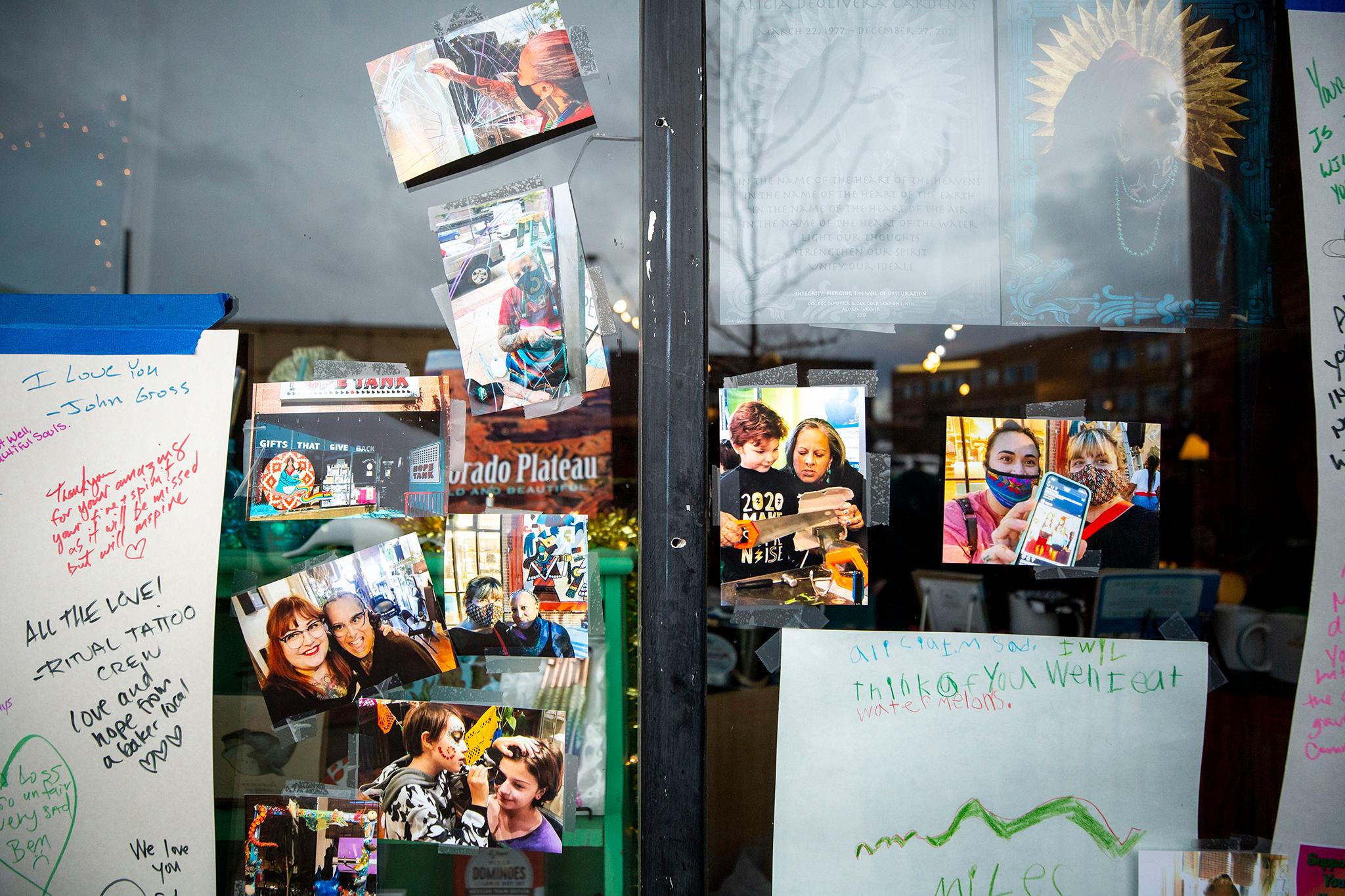The reasons to get a tattoo are as varied as the people who get them.
A tattoo can be a commemoration of a loved one or a memory. It can be a way to process grief or extend moments of joy. It can be a piece of art. Sometimes a tattoo is a combination of all these things.
The process of getting a tattoo includes not only choosing what it will be, but who will create it. For many people, this is as important as the tattoo itself. The creation of some pieces can be spread over multiple hours-long sessions. Sitting for that long — at arm’s length from another person — engenders camaraderie, conversation and sometimes, catharsis.
Alicia Cardenas, owner of Sol Tribe Tattoo in Denver, and Danny “Dano” Scofield, a tattooer at Lucky 13 in Lakewood, were known for how they connected with clients and the communities around them. When a gunman went on a shooting rampage through Denver and Lakewood late last month, he killed five people, including the two tattoo artists.
The holes left in their absence extend past their tattoo services: both artists were anchors of their communities, serving as confidants and friends to many. As their communities pick up the pieces after the tragedy, the people they touched say they’ll carry on. Here are some of their stories.
These interviews have been edited and condensed for clarity and length.
Armando Lopez
The most recent tattoo is one of three sleeve sessions that was going to be full of culture work and day signs commemorating my indigenous ties. I sought out Sol Tribe for its reputation in the community for doing this kind of culture work. Once I saw Alicia’s work and understood who she was as the owner, founder and matriarchal figure, I wanted to work with her.
I listened to some interviews Alicia gave about her work, and in them she said that every tattoo — every “bloodletting,” as she would call it — is a type of ritual. It’s a type of exchange between the artist and the person who is sitting there and being bled out.
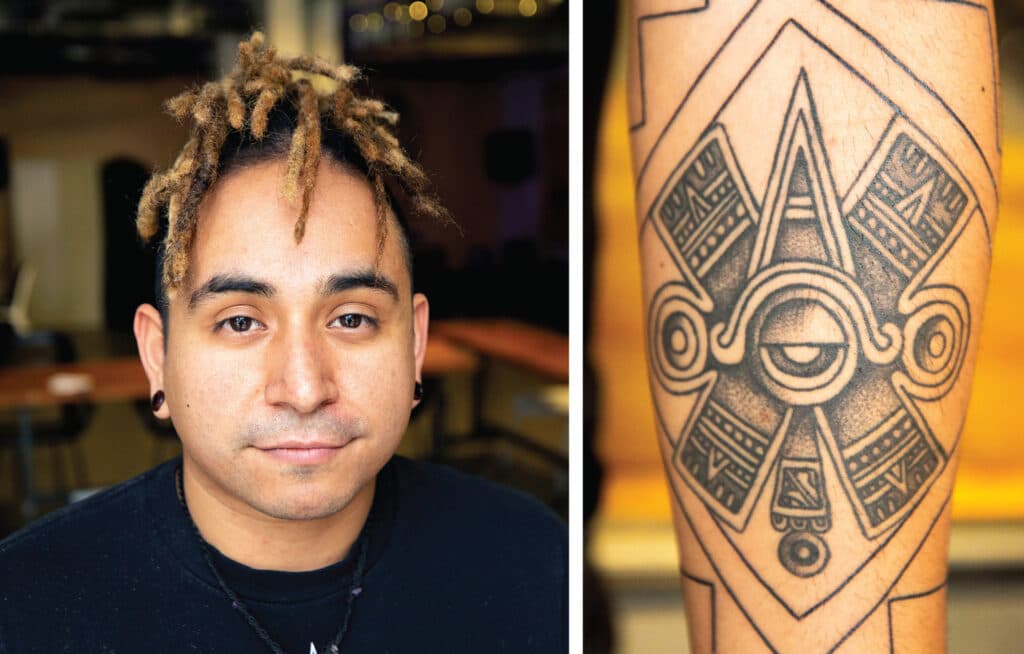
What that meant to me was being able to sit with her in a session and her “getting it” from her decades of work in the community and shaking up the industry with a warrior-healer spirit that I felt drawn to as a musician, and as an advocate for social and climate justice. She had so much wisdom to share about how to navigate that space and come out on top — while trusting the ancestors to flow through us. I’ve never experienced anything like it.
During our last session, which was several hours long, we spoke a lot about how she was able to balance being a creator and a business owner. I play in a band called Brothers of Brass and we do racial justice work: supporting protests, making movement music. She loved us. She saw us on the street a lot and it spoke to her spirit of getting out there into the public eye. We talked about the type of healing — what she called “ancient magic” — that we do through our work.
I nearly died in that act of premeditated hate. Her absence for me is devastating. (Editor’s note: Lopez’s session with Alicia ended early, shortly before the gunman entered the shop.)
For anyone who feels that the killing was justified, or you feel that we are a problem, I want to say that we are not afraid and we are standing in unity. We’re not going anywhere.
Najla Kimball
My friend started getting tattoos from Dano six or seven years ago. I would go and sit in on her sessions, and very quickly, I started getting my own work done. Dano would post drawings on Facebook and I would say that I wanted it done as a tattoo. Every two or three months, I was going in to get something from him. I easily have twenty pieces.
Dano worked so fast, even though what he did was so awesome. He transitioned from a traditional tattoo gun to what I call the tattoo laser, which is sort of a USB singular machine that isn’t tethered to any cords. That allowed him to work in a much better way, and made him more gentle. It was always funny for Dano, because he would be like, ‘I don’t want to hurt you, but this is what you came in here for.’
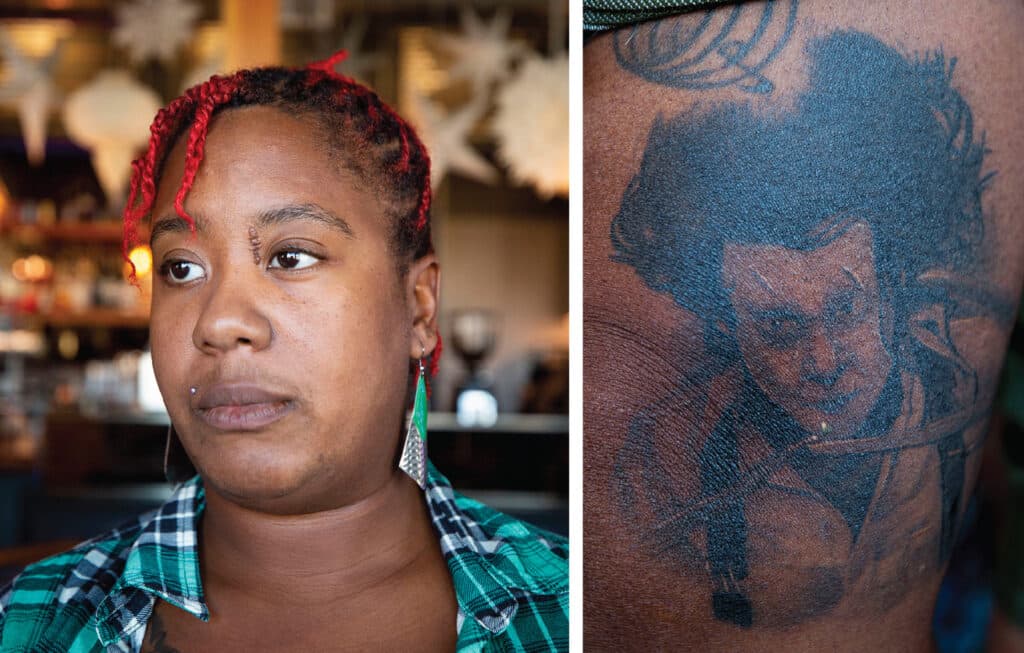
We would always catch up on what happened after the last time I saw him. The day would be more of a hang out with Dano, and tattoos were a happy little bonus than the platform for your relationship.
It was always really cool to hear all of the other stuff he was doing. He was making fingerboards, as in finger-sized skateboards, and he was making his own tattoo healing gel — he was doing so many things that made him who he was and it was cool to hear about it.
Usually, you have to find a couple of artists and get a few tattoos before you feel a connection with your tattooer, but with Dano that was really easy for me to do. The friendship didn’t feel like it was something I was building, instead it was just an environment I was coming into.
When you talk about tattoo therapy: it’s how some of us process grief, and how we process even positive things in life. He was a big part of a lot of really huge moments in my life, both good and bad.
Erika Righter
Alicia created a tattoo for me. She pushed me to look into my roots, which are in Ireland and Russia. She had images and references from all over the world that she drew from, and she created something that was her style, but reflected my roots.
It is not a finished tattoo; the plan was to keep going back. It’s a ceremony getting tattooed, but getting tattooed by Alicia was a transformative experience. She allowed you to have space with her that was sacred. You know, you always think you have more time.
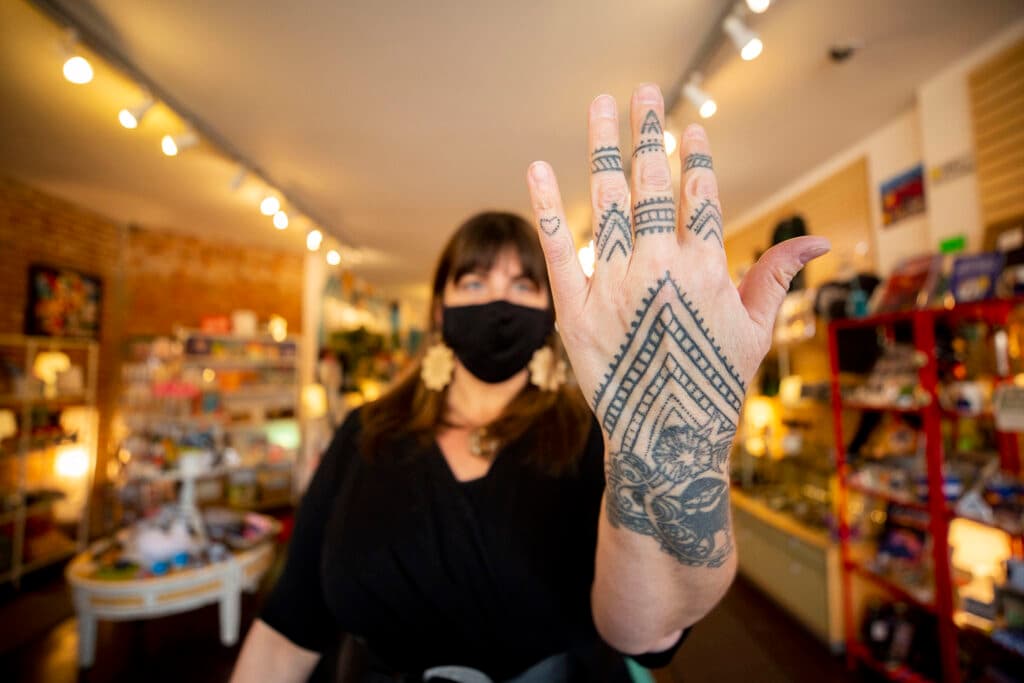
She met you where you were; she didn’t have an agenda. For some people, when they get a tattoo, they talk; for some people, they cry; for some people, they sit quietly. She had the ability to connect with people from every single walk of life.
With digital media, we have a record of her work. People can go learn, not just about tattooing, but about indigeneity, and about the industry and about challenging how the industry goes about things. She created so much content that is out in the world that people can learn more about her legacy.
Richard Kimball
I met Dan through my wife, Najla, who got tattoos from him. I was always struck by how beautiful an individual he is — or, was. When it comes to getting tattoos, it’s a really serious bond you have with that person because tattoos are forever. There’s trust involved. With Dan, I felt the trust straight off the bat and I have nine tattoos from him.
The first tattoo Dan did for me was a cat on the inside of my left forearm. It was fantastic because I like symmetry in my body art, and this tattoo offset a piece I wanted to get on my right arm. I’ve gotten a tattoo from him every few months since then.
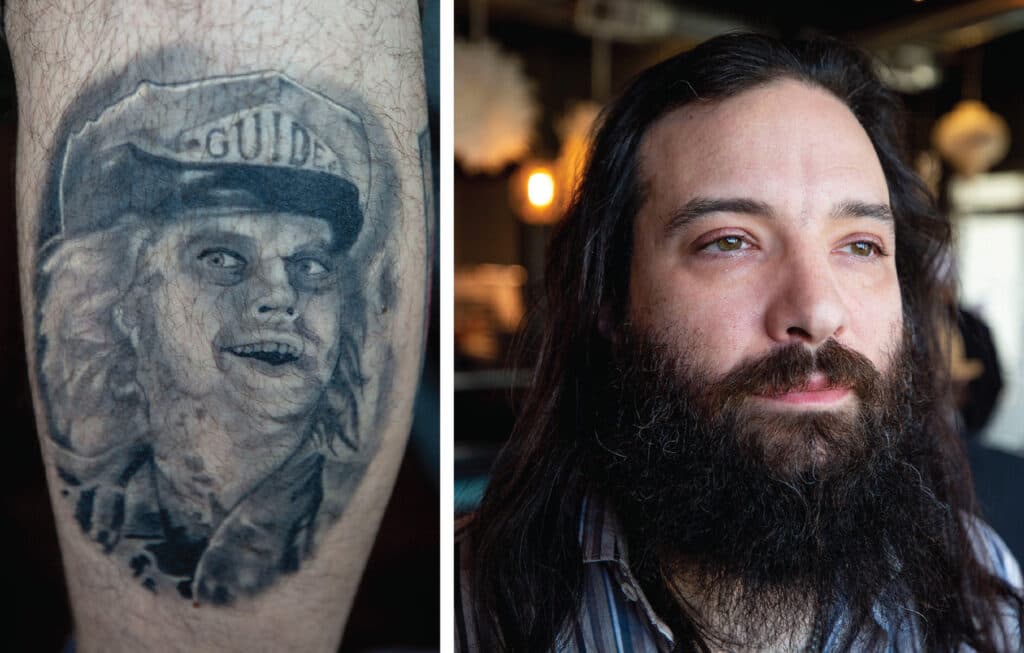
The last tattoo he did for me was in October, 2021. He would always do an October special for horror-themed tattoos. My wife and I both went in for a tattoo date, and he did a Beetlejuice portrait for me on my left calf and an Edward Scissorhands portrait for her.
For me, tattoos can be very personal in my own healing process. With all that’s involved in getting a tattoo — the pain, the sitting for long periods of time, the cleaning solutions — tattooers are artists, sure, but they’re also a confidant, a friend, someone you can tell anything to because of how long you sit there. Dan was a machine; The man was a printer.
I’ve had three tattoo artists total in my life, one of whom I unfortunately lost to heroin. That makes two now that I’ve lost. I don’t know if Dano’s death is hitting me extra hard because of that, but it’s hitting hard. It’s like losing a friend, losing an artist, losing a confidant. It’s just painful.
Z Williams
I knew Alicia from outside the tattoo world and we met in the un-schooling and radical parenting space. A few years ago, a good friend of mine died and it was a very hard death to process. Their last name was Rabbit and they called themselves a stompy baby unicorn. In the middle of all of my grieving, I went to Alicia and told her I wanted a tattoo that captured my friend. She drew up this unicorn rabbit that has a very salty facial expression. It was perfect.
My first tattoo with Alicia was a very somber occasion. I brought in a bunch of photos of my friend and we hung them up in her studio, which made the experience feel like a ceremony. We spent a lot of time talking about how many of our friends have passed away and how we can still connect with people who have died.
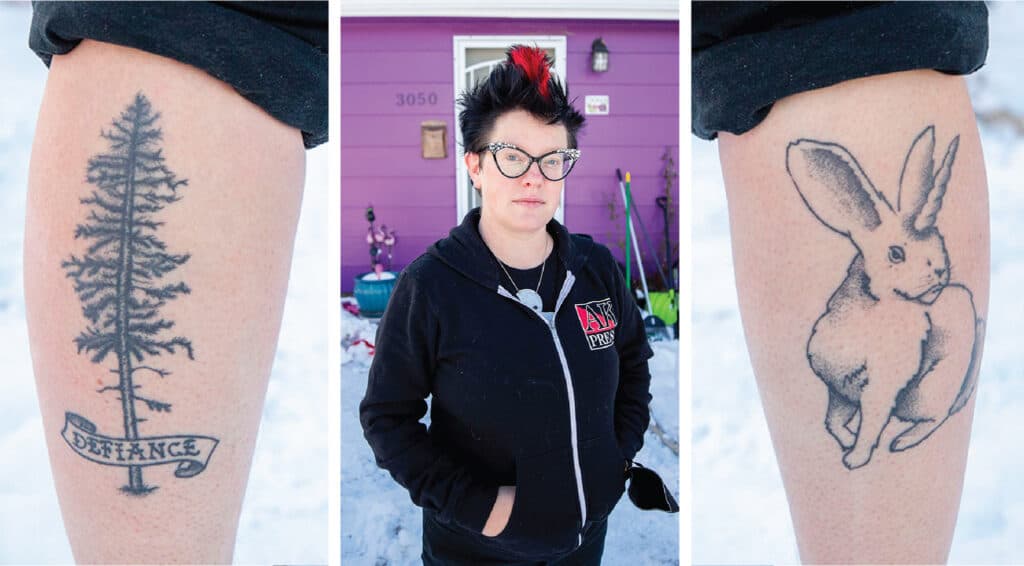
I got my second tattoo with Alicia in the summer of 2020; the piece is to honor my four-year-old, whose middle name is Defiance. Alicia was a big influence on me as a parent, in terms of thinking about kids as human beings who deserve a lot of respect and freedom. So, it felt appropriate for her to give me a tattoo and honor one of my kids. We talked about the protests — I was doing legal support, she was doing medical support – and our hopes for the pandemic getting easier.
A lot of cultures around the world have rituals for when someone dies. The idea of sacrificing something in devotion to someone you love is powerful — and tattoos are permanent. Our physical bodies can be taken off this planet at any point in time, but you can always keep that person with you when their memory is tattooed on your body.
The way I’ve been honoring Alicia is trying to show up for the community in the way that she did. She was a mom to more than her own kid; she was a mom to a lot of people in the community and gave a lot of care.
Liv Milner
I have a tattoo that says “Live On” on my wrist. I almost died in a bombing when I was 16 years old in Cape Town, South Africa. Sixteen years later, I went to the spot where it happened and there was a sculpture that said “Live on” when you looked at it from land, but when you looked at it from the ocean, it said “No evil.”
I got that tattoo because it is permanent, and because life is permanent. I wanted it as a reminder on my wrist — somewhere I could see it — that I have to live on every day. It feels very poignant to me that Alicia was the person who did this. I asked everyone I knew which tattoo artist would be good with scars (because I’m covered in scars) and everyone said Alicia.
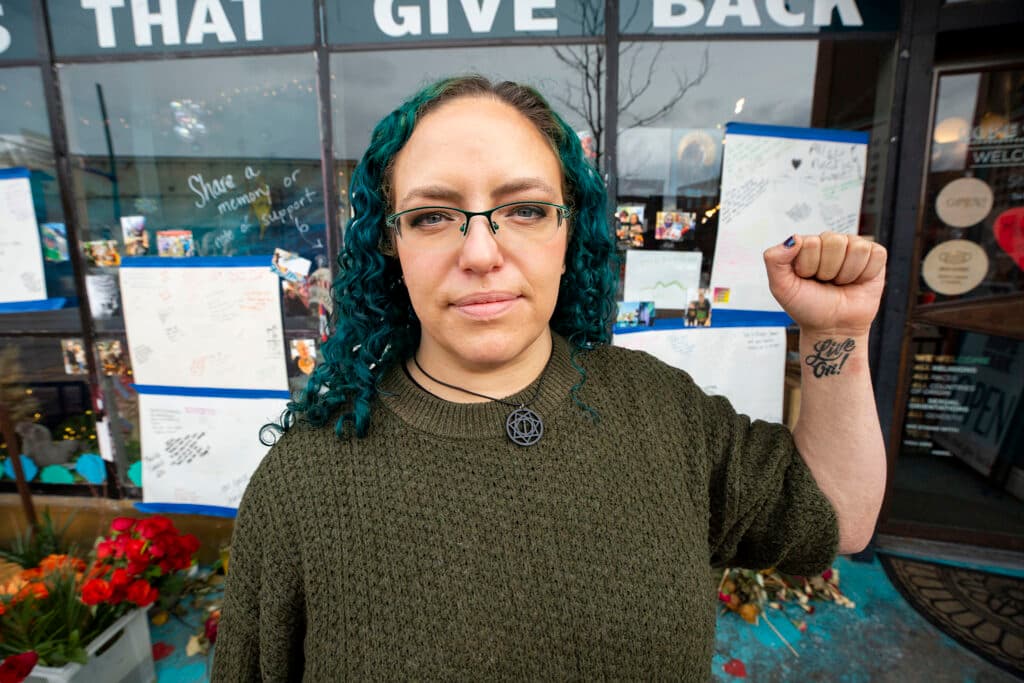
When I got the tattoo done, I thought it would be this happy, freeing moment, but it was actually difficult and traumatic because it brought back some of the experience [of the bombing]. But Alicia was ready for that and she guided me through it. She was the perfect person for this kind of emotional testament.
The weeks after I got the tattoo stood out to me because she texted me to ask how I was doing and how the healing was going. I responded that it was fine, but when she saw me a few weeks later, she asked, “Now really, how is it?” I actually got teary and told her that I was having this emotional experience, that getting the tattoo brought up old wounds. She totally understood.
The screwy thing about Alicia being gone is that she was the person who seemed to understand death. For so many people, she held that space and bridged the gap between those we have lost and those that are here. I feel like it’s extra shocking that she’s gone because she was the person who would have helped us all deal with this.
